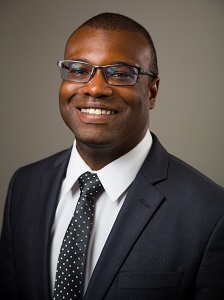
Antonio Byrd (he/they) teaches courses in Black literacies, professional and technical communication, multimodal writing and rhetorics, digital rhetoric, and composition. His research focuses on how the legacies of using literacy for liberation carry forward into present day Black digital literacies and media features. Antonio serves as co-chair for MLA Task Force on Generative AI Initiatives Standing and is a member of the CCCC Special Committee on GenAI. His work has appeared in College Composition and Communication, Literacy in Composition Studies, Technical Communication Quarterly, and Writer: Craft and Context. In 2025, Dr. Byrd published his first book manuscript, Black Tech Ecosystems: How Black Adult Learners Use Computer Code Bootcamps for Liberation with The WAC Clearinghouse.
Dr. Byrd is an affiliate faculty for UMKC's Center for Digital and Public Humanities. His work in digital and public humanities focuses on community engaged scholarship and digital literacy by connecting UMKC students with community partners and industry professionals for real world application of digital writing.
Ph.D. in Composition and Rhetoric, University of Wisconsin-Madison (2019)
M.A. in Liberal Arts, emphasis in English, Auburn University at Montgomery (2014)
B.S. in Secondary Education – English/Language Arts, Auburn University at Montgomery (2011)
Byrd, A., Novotny, M., Pemberton, M., and Young, V.A. (2022) Frameworks, triumphs, and challenges for social justice conference planning. Writer’s: Craft & Context.
DOI: https://doi.org/10.15763/issn.2688-9595.2022.3.1.28-44
Byrd, A. (2022) Black professional communicators testifying to Black technical joy, Black
technical and professional communication [special issue] Technical Communication Quarterly,
DOI: 10.1080/10572252.2022.2069287
Byrd, A. (2020). Like coming home: African American adults tinkering and playing toward a
code bootcamp. College Composition and Communication Vol. 71, (3), 426 – 452.
Byrd, A. (2019). Between learning and opportunity: A study of African American adult coders’
networks of support. Literacy in Composition Studies Vol. 7(2), 31-56. DOI: http://dx.doi.org/10.21623%2F1.7.2.3